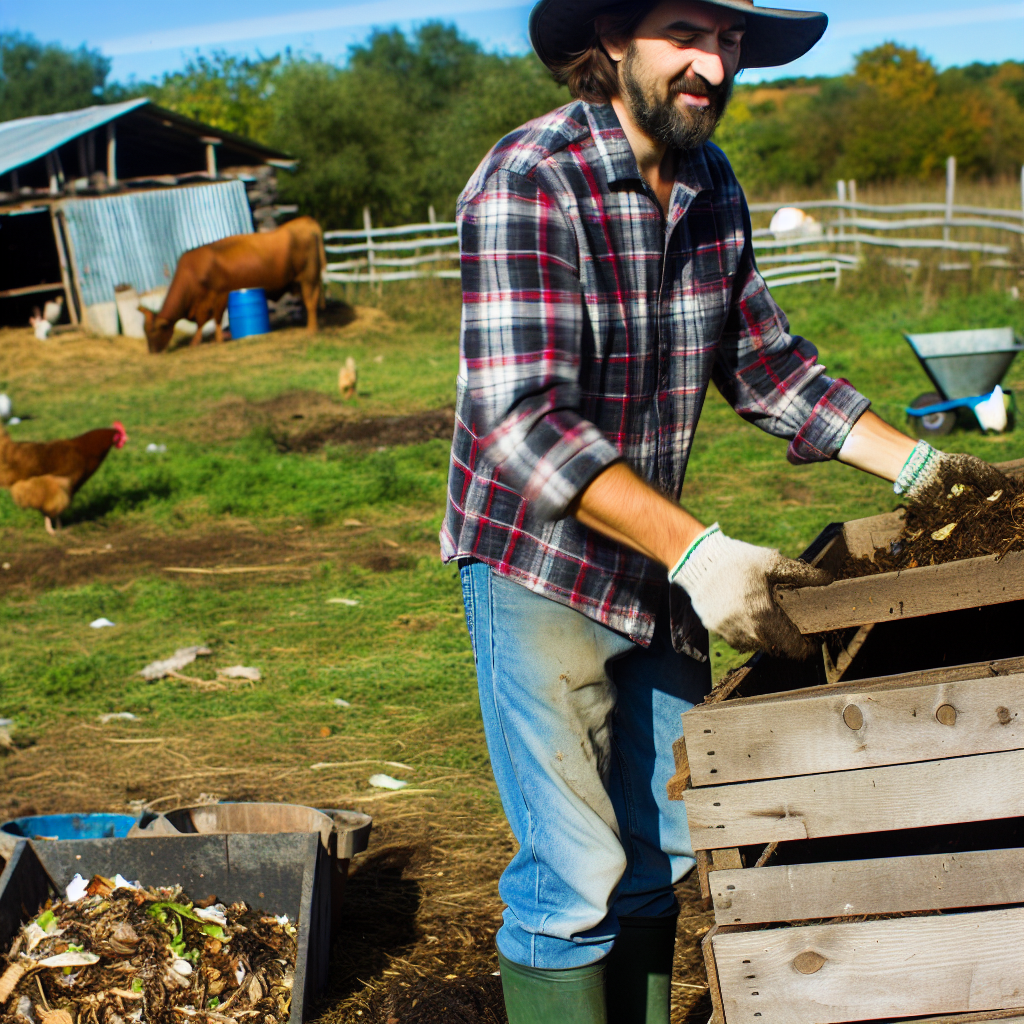Introduction to Waste Management in Agriculture
Effective waste management is crucial for farms.
It helps reduce negative environmental impacts.
Farm operations generate various types of waste.
Common waste includes organic matter, plastics, and chemicals.
Implementing efficient management strategies is essential.
This approach not only supports sustainability but also improves profitability.
Understanding Agricultural Waste
Agricultural waste primarily consists of crop residues.
Animal waste and packaging materials also contribute significantly.
Each waste type presents unique management challenges.
Understanding these differences aids in waste reduction efforts.
The Importance of Waste Reduction
Reducing waste lowers disposal costs.
It also minimizes the carbon footprint of farming operations.
Additionally, effective reduction practices promote soil health.
Healthy soils yield better crop production over time.
Current Regulations and Best Practices
Farmers must comply with relevant waste regulations.
Transform Your Agribusiness
Unlock your farm's potential with expert advice tailored to your needs. Get actionable steps that drive real results.
Get StartedPracticing best management can prevent legal issues.
These practices often involve recycling and composting waste.
Furthermore, adopting eco-friendly products enhances sustainability.
Types of Waste Generated on Farms
Organic Waste
Organic waste comprises plant materials and animal manure.
This type of waste is biodegradable and can enhance soil health.
Examples of organic waste include crop residues, food waste, and livestock manure.
Farmers can compost organic waste to create nutrient-rich soil amendments.
Composting reduces waste volume while improving soil fertility.
Additionally, it minimizes the need for chemical fertilizers.
Inorganic Waste
Inorganic waste includes materials that do not decompose easily.
This category often involves plastics, metals, and glass.
Farmers generate inorganic waste from packaging, equipment, and construction materials.
Proper disposal and recycling of inorganic waste reduce environmental impacts.
Recycling can reclaim valuable resources and cut disposal costs.
Hazardous Waste
Hazardous waste poses significant risks to health and the environment.
This includes pesticides, herbicides, and other chemical products.
Improper handling of hazardous waste can lead to soil and water contamination.
Farmers must follow regulations for the safe disposal of hazardous materials.
Implementing safety protocols protects farm workers and local communities.
Regular training on hazardous waste management is crucial for compliance.
The Importance of Waste Management for Sustainable Farming
Enhancing Environmental Health
Effective waste management significantly enhances environmental health on farms.
By reducing pollution, farms contribute to cleaner air and water quality.
This approach also helps in preserving local ecosystems.
Improving Farm Efficiency
Implementing waste management strategies improves farm efficiency.
Showcase Your Farming Business
Publish your professional farming services profile on our blog for a one-time fee of $200 and reach a dedicated audience of farmers and agribusiness owners.
Publish Your ProfileFarmers can recycle resources, leading to reduced costs.
Moreover, waste reduction often translates to better yield outcomes.
Boosting Soil Fertility
Managing organic waste contributes to improved soil fertility.
Composting transforms waste into nutrient-rich soil amendments.
This process fosters healthier crop growth and increases biodiversity.
Supporting Regulatory Compliance
A strong waste management plan supports compliance with environmental regulations.
Farmers avoid fines by adhering to local waste disposal laws.
Additionally, proactive management practices improve community relations.
Raising Awareness and Education
Effective waste management raises awareness among farmworkers.
Education on waste reduction techniques promotes responsible practices.
Consequently, a knowledgeable workforce can significantly impact farm sustainability.
Uncover the Details: The Role of Crop Diversity in Sustainable Agriculture
Implementing Composting Practices for Organic Waste Reduction
Understanding Composting
Composting transforms organic waste into valuable soil amendment.
This process reduces waste while enriching soil health.
It utilizes microorganisms to break down organic matter.
Understanding the composting process is crucial for effectiveness.
Benefits of Composting on Farms
Composting offers numerous benefits for farm operations.
Firstly, it reduces the volume of waste disposed of in landfills.
Secondly, compost enriches the soil with essential nutrients.
This practice also improves soil structure and moisture retention.
Moreover, composting lowers greenhouse gas emissions.
Steps to Implement Composting Practices
Implementing composting on your farm involves several steps.
Begin by selecting an appropriate composting method.
For instance, you may choose static pile, aerated pile, or vermicomposting.
Next, assess the materials available for composting.
Collect organic waste such as fruit scraps, vegetable peels, and manure.
Establishing a Composting Site
Designate a specific area for composting on your farm.
This site should be easily accessible yet away from water sources.
Ensure proper drainage to prevent excess moisture buildup.
Maintaining the Composting Process
Regularly turn the compost to aerate it effectively.
Monitor moisture levels; aim for a damp, sponge-like consistency.
Additionally, keep track of temperatures to assess microbial activity.
Continue adding materials gradually to maintain a healthy balance.
Overcoming Challenges in Composting
Despite its advantages, farmers may face challenges with composting.
For example, odor issues can arise from improper waste management.
To mitigate this, ensure sufficient aeration and balance materials.
Furthermore, pests may be attracted to compost piles.
Implementing proper covering techniques can help deter them.
Networking and Resources for Successful Composting
Networking with other farmers can enhance composting success.
Join local agricultural workshops or online forums.
Showcase Your Farming Business
Publish your professional farming services profile on our blog for a one-time fee of $200 and reach a dedicated audience of farmers and agribusiness owners.
Publish Your ProfileConsult resources from agricultural extension offices for best practices.
Moreover, consider subscribing to newsletters focused on sustainable farming.
Delve into the Subject: Boosting Farm Productivity with Crop Diversity Techniques
Recycling and Repurposing Non-Biodegradable Materials
Importance of Recycling
Recycling non-biodegradable materials reduces waste significantly.
It conserves natural resources and energy.
Furthermore, it minimizes the harmful impact on the environment.
Types of Non-Biodegradable Materials
Common non-biodegradable materials include plastics, metals, and glass.
These materials require special handling due to their durability.
Understanding each type helps farmers develop effective strategies.
Collection and Separation
Implement a system for collecting non-biodegradable waste.
Clearly label bins to facilitate proper sorting.
Encourage farm employees to participate in the separation process.
Regular training can improve compliance and awareness.
Partnering with Recycling Facilities
Establish partnerships with local recycling facilities.
These facilities can provide guidance on proper recycling methods.
Additionally, they may offer financial incentives for large quantities recycled.
Repurposing Strategies
Repurposing materials can add value and reduce waste.
Creative farmers find new uses for items like old containers and pallets.
For instance, wooden pallets can become garden planters or compost bins.
Creating a Recycling Plan
Develop a comprehensive recycling and repurposing plan for your farm.
This plan should outline processes, responsibilities, and goals.
Regularly review and update the plan to ensure effectiveness.
Educating Employees and Visitors
Conduct workshops to educate employees about recycling practices.
Provide informational materials for farm visitors as well.
Awareness fosters a culture of sustainability on the farm.
Monitoring and Reporting Progress
Establish metrics to track recycling efforts over time.
Regularly report progress to staff and stakeholders.
This transparency can inspire further participation and improvements.
You Might Also Like: IPM: A Comprehensive Guide for Sustainable Farms
Developing a Waste Management Plan
Assessing Waste Types
Begin by identifying all waste materials produced on the farm.
Common waste types include organic, plastic, and chemical waste.
Next, categorize each waste type based on its characteristics.
This categorization will help prioritize waste management efforts.
Setting Monitoring Protocols
Implement regular monitoring of waste generation.
Use data collection methods to track waste amounts and types.
Establish a timeline for conducting these assessments.
For instance, consider monthly reviews for effective monitoring.
Engaging Farm Staff
Involve your farm staff in the waste management planning process.
Provide training sessions on waste reduction techniques.
Encourage employees to suggest improvements to current practices.
Showcase Your Farming Business
Publish your professional farming services profile on our blog for a one-time fee of $200 and reach a dedicated audience of farmers and agribusiness owners.
Publish Your ProfileThis engagement fosters a sense of ownership and responsibility.
Implementing the Plan
Once the plan is finalized, initiate its implementation promptly.
Assign specific roles to staff for managing different waste streams.
Monitor the plan’s effectiveness regularly and adjust as needed.
Adaptation may include changing practices based on waste audits.
Evaluating Outcomes
Conduct periodic evaluations of the waste management plan.
Assess both qualitative and quantitative results.
Use feedback from staff to identify areas for improvement.
Adjust strategies to enhance waste reduction efforts over time.
Find Out More: Companion Planting to Boost Farm Biodiversity

Technological Innovations in Farm Waste Management
Introduction to Technology in Waste Management
Technology plays a critical role in modern waste management on farms.
It enables farmers to minimize waste and enhance recycling efforts.
Moreover, technology fosters sustainable practices across agricultural sectors.
Smart Waste Tracking Systems
Smart waste tracking systems improve the efficiency of waste management.
These systems utilize sensors and data analytics to monitor waste levels.
Farmers can receive real-time alerts about waste accumulation.
This proactive approach helps in making timely decisions.
Biogas Technology
Biogas technology transforms organic waste into renewable energy.
Farmers can use anaerobic digesters to process livestock manure.
In this process, microorganisms break down organic material in the absence of oxygen.
The resulting biogas can power equipment or generate electricity.
Additionally, the byproducts can serve as nutrient-rich fertilizer.
Automated Composting Solutions
Automated composting systems streamline the composting process.
These systems involve turning organic waste into compost more efficiently.
They often include heated chambers to enhance decomposition rates.
Furthermore, automated monitoring maintains optimal conditions for composting.
Waste Management Apps and Software
Farm management applications aid in tracking and managing waste flows.
These tools provide insights into waste generation patterns over time.
Farmers can analyze data to identify areas for improvement.
In addition, many apps offer reminders for waste disposal schedules.
Recycling Technologies for Plastics and Packaging
Innovative technologies for recycling plastics are essential for sustainability.
Farmers can now utilize specialized machines to process plastic waste.
These machines convert waste into reusable materials for agricultural purposes.
Thus, farms can significantly reduce their environmental impact.
Integration of Drones
Drones are emerging as effective tools for waste management inspections.
They can quickly assess waste disposal locations and environmental conditions.
Farmers gain valuable insights without disrupting operations.
Additionally, drones facilitate efficient waste mapping and planning.
Future Directions in Farm Waste Management
Embracing technological innovations can significantly improve waste management in agriculture.
As these technologies advance, their adoption will likely grow.
Showcase Your Farming Business
Publish your professional farming services profile on our blog for a one-time fee of $200 and reach a dedicated audience of farmers and agribusiness owners.
Publish Your ProfileFarmers must remain informed about emerging trends in waste management.
Ultimately, adopting these innovations creates a more sustainable farming future.
Case Studies: Successful Waste Management Strategies from Various Farms
Farm A: Composting Success
Farm A implemented a robust composting system.
This process effectively transforms organic waste into nutrient-rich fertilizer.
Consequently, Farm A reduced its waste by 40% over two years.
The composting method improved soil quality significantly.
This technique has led to healthier crops and increased yields.
Farm B: Innovative Recycling Practices
Farm B adopted innovative recycling techniques to manage plastic waste.
The farm partnered with local recycling facilities.
They now successfully recycle 85% of their plastic materials.
This initiative not only minimizes waste but also saves money.
Farm B demonstrates that collaboration is key in waste management.
Farm C: Efficient Manure Management
Farm C focused on efficient manure management practices.
They installed anaerobic digesters to convert manure into energy.
This process generates electricity while reducing methane emissions.
Farm C now powers a portion of its operations sustainably.
Additionally, the byproduct is rich in fertilizer nutrients.
Farm D: Cover Cropping and Soil Health
Farm D utilizes cover cropping to manage agricultural waste.
These crops enhance soil health and prevent erosion.
The practice captures nutrients that would otherwise be lost.
Farm D has seen an increase in biodiversity as a result.
This strategy fosters a sustainable farming ecosystem.
Farm E: Community Engagement and Education
Farm E engages the local community in waste management practices.
They host workshops on composting and recycling methods.
Furthermore, these events increase awareness around sustainable practices.
Farm E tracks waste reduction through community participation.
This approach builds a stronger foundation for environmental stewardship.
Regulatory Compliance and Best Practices in Waste Disposal
Understanding Regulatory Requirements
Farmers must understand local, state, and federal regulations regarding waste management.
These regulations often dictate how waste materials should be handled and disposed of.
Awareness of these rules helps farms avoid fines and legal issues.
Additionally, compliance enhances the farm’s reputation within the community.
Developing a Waste Management Plan
A comprehensive waste management plan is essential for effective disposal strategies.
This plan should outline waste types generated by the farm and their specific disposal methods.
For instance, organic waste can often be composted.
Conversely, hazardous waste requires specialized disposal methods.
Establishing clear protocols improves efficiency and compliance.
Best Practices for Waste Disposal
Adopting best practices can significantly reduce waste and promote sustainability.
First, implement recycling programs for materials like plastics and metals.
Next, encourage employees to engage in waste-reduction efforts.
Training staff ensures everyone understands best practices.
Showcase Your Farming Business
Publish your professional farming services profile on our blog for a one-time fee of $200 and reach a dedicated audience of farmers and agribusiness owners.
Publish Your ProfileMoreover, conduct regular waste audits to identify areas for improvement.
Engaging with Local Authorities and Experts
Farmers should actively engage with local environmental authorities.
These agencies can provide valuable resources and insights into compliant practices.
Furthermore, consider consulting waste management experts for tailored solutions.
Collaboration can lead to innovative waste reduction approaches.
Monitoring and Reviewing Waste Management Practices
Monitoring waste management practices ensures ongoing compliance and improvement.
Set up regular reviews of the waste management plan.
Use these reviews to assess the effectiveness of current strategies.
Furthermore, adjust the plan as needed to incorporate new regulations or technologies.
Continuous improvement fosters a culture of sustainability on the farm.
Future Trends in Farm Waste Management: Circular Economy Approaches
Introduction to Circular Economy
The circular economy redefines waste as a resource.
This model emphasizes sustainability and resource efficiency.
Farm operations can significantly benefit from this approach.
Implementing Circular Principles
Farmers can start by analyzing their waste streams.
This includes identifying materials that can be reused or recycled.
Composting organic waste is a practical strategy.
Farmers should also explore bioenergy options for waste disposal.
Reducing Waste Generation
One key goal is waste minimization at source.
Farmers can use precision agriculture techniques to achieve this.
Furthermore, planning crop rotations can help reduce unnecessary waste.
This strategy optimizes resource use and minimizes excess.
Collaborative Models in Waste Management
Collaboration among farms enhances resource sharing.
Local partnerships can lead to better waste utilization.
Farmers might consider joining cooperatives focused on waste management.
These efforts can also foster community engagement and support.
Technology in Circular Economy Practices
Emerging technologies can streamline waste management processes.
For instance, drones can monitor crop health and waste efficiently.
Additionally, software solutions can track waste generation and disposal.
Investing in technology can significantly enhance operational efficiency.
Case Studies and Success Stories
Several farms have successfully implemented circular economy models.
For instance, Green Valley Farms converted waste into compost.
This initiative significantly reduced landfill contributions.
Moreover, Maple Ridge Dairy transformed waste into renewable energy.
These examples illustrate feasible pathways for other farms.
The Role of Policy in Supporting Circular Practices
Government policies can incentivize sustainable waste practices.
Subsidies for recycling programs encourage farmer participation.
Moreover, educational initiatives increase awareness of circular economy benefits.
Such supportive frameworks are essential for widespread adoption.
Additional Resources
Sustainable Agriculture Programs | NIFA
What is Sustainable Agriculture? | Union of Concerned Scientists
Showcase Your Farming Business
Publish your professional farming services profile on our blog for a one-time fee of $200 and reach a dedicated audience of farmers and agribusiness owners.
Publish Your Profile



